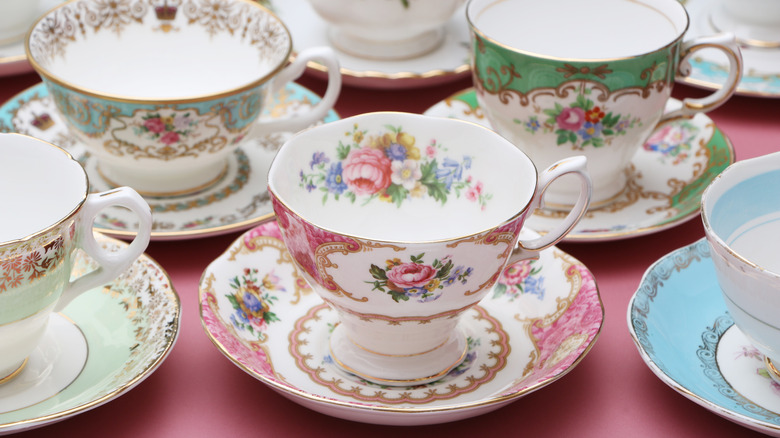An Easy Way To Make Stains In Vintage China Completely Disappear
Vintage and antique china can be one of the most beautiful ways to set a table, bringing a sense of style, history, and retro kitchen charm to any occasion. This includes inherited china pieces that have passed through the family for generations, as well as thrifted, antique store, or flea market pieces that you have accumulated over time. However, some older pieces can sometimes feature a pesky stain that is the result of tiny cracks that form in the surface of the glazed porcelain called crazing. Crazing can manifest as visible hairline cracks or stained areas on the surface. Rather than tossing these gorgeous antiques, there is a clever and easy solution for fixing them involving hydrogen peroxide and a low set oven that will make your old dishes look almost as good as new.
The staining is usually the result of tiny bacteria and debris that has seeped into the tiny cracks that arise due to regular use over time, moisture, and temperature variation. The technique below can be a great way to cosmetically restore dishes, especially when you like to decorate with pottery in your home. Cleaning can also make it more usable, since badly crazed dishes can sometimes harbor bacteria you may not want to touch your food.
Removing stains with hydrogen peroxide
Begin your stain removal by soaking the dish in a solution of 8% hydrogen peroxide for at least 24 hours. This will allow the peroxide to penetrate the tiny cracks and begin to remove the debris. Follow it up the next day by placing the dish in the oven once it reaches 250 degrees, allowing it to heat gradually to prevent more damage, leaving it in their for an hour. When you remove it from the oven, wipe away any substance that has risen to the surface of the porcelain. For more tenacious stains, repeat the process until you get the desired results.
If you have some beautiful old dishes and want to prevent crazing in the future, keep in mind how you use, clean, and store your vintage dishes. Lots of submersion in moisture, wild temperature variations, and using them for high stain-prone foods, like berries and coffee, can create stains and cause additional crazing over time. There are also many types of vintage glassware that you should never put into the dishwasher to prevent crazing. Other kinds of marks on vintage porcelain, like scuffs and scrapes from cutlery, can often be removed or minimized with a paste of baking soda and water applied with a toothbrush.
